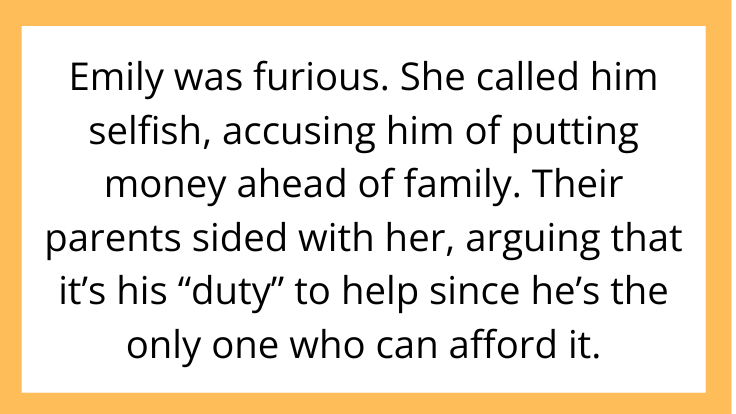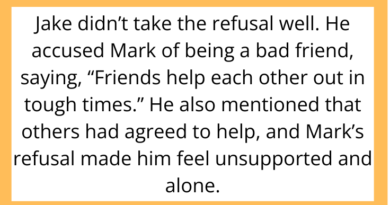AITAH for Refusing to Pay for My Sister’s Wedding After She Called Me Selfish?
When it comes to family obligations, nothing stirs up drama quite like money. In today’s AITAH scenario, we’re diving into a heated family dispute over who should foot the bill for a lavish wedding—and whether standing your ground makes you heartless.
Let’s unpack the story.
The Situation: A Sibling Showdown Over Wedding Expenses

A 34-year-old man—let’s call him Sam—shared on r/AITAH that his younger sister, Emily, 28, is planning a large, extravagant wedding. Emily and her fiancé have minimal savings and were counting on family contributions to cover their dream celebration.
Sam is the eldest sibling and the most financially stable. He owns his home, has no debt, and earns a six-figure income. Over the years, he has helped out family members with smaller expenses—car repairs, rent during hard times—but never anything on this scale.
When Emily announced she needed $25,000 to complete her wedding budget, she assumed Sam would be willing to write the check. After all, “you have the money,” she said.
Sam refused. He explained that while he has savings, he’s been working toward early retirement, and handing over that much cash would derail his plans. He offered a smaller contribution—$2,500—but said the rest was up to Emily to figure out.
Emily was furious. She called him selfish, accusing him of putting money ahead of family. Their parents sided with her, arguing that it’s his “duty” to help since he’s the only one who can afford it.
Sam turned to Reddit for clarity: Am I the villain for saying no?
Entitlement or Expectation? Understanding the Dynamics

Why Emily Feels Entitled
From Emily’s perspective, Sam has always been the dependable older brother. He’s bailed her out before, so this felt like a natural extension of that pattern. She believes that family should support each other unconditionally, especially for major life milestones.
Moreover, weddings are often emotionally charged. For many people, they symbolize love, stability, and status. Emily’s dream wedding wasn’t just about one day—it was about feeling celebrated.
Why Sam Drew the Line
On the other hand, Sam has every right to decide how he spends his money. He’s worked for decades to build security and independence. Just because he can afford something doesn’t mean he’s obligated to.
Sam also recognized a crucial boundary: helping someone with an emergency is different from funding a luxury event. A wedding is not an essential expense, and he offered a reasonable alternative instead of a blank check.
The Reddit Verdict: Not the Villain

Reddit’s AITAH community overwhelmingly sided with Sam.
One top comment read: “NTA. You’re not obligated to bankroll someone else’s choices, no matter how entitled they feel.”
Others pointed out that this is a classic case of financial boundaries. If you repeatedly rescue someone, they start to expect it. By saying no, Sam was finally establishing a limit.
A smaller minority empathized with Emily, suggesting Sam could have communicated earlier that he wouldn’t be funding the wedding in full. But even those commenters agreed that the expectation was unreasonable.
Why Money and Family Rarely Mix Smoothly

Financial Inequality Creates Resentment
When one sibling is significantly better off, it often breeds tension. Less affluent family members may feel overlooked or jealous, even when there’s no malice involved.
Emily’s reaction—calling Sam selfish—probably stems from feeling powerless. She wanted something she couldn’t afford and felt humiliated by having to scale back her plans.
Boundaries Protect Relationships
Many families fracture over money because expectations go unspoken. Sam made the right choice by offering a smaller contribution rather than ghosting the conversation entirely. Clear communication, even when uncomfortable, is the best way to prevent long-term resentment.
Should You Pay for Someone Else’s Wedding?

If you find yourself in a similar situation, consider these questions before you decide:
-
Can you afford it without harming your own goals?
-
Are you giving freely, or out of guilt?
-
Would saying yes set a precedent you’re not comfortable with?
-
Would the relationship be damaged more by helping or by refusing?
The answer isn’t always simple, but honesty and boundaries go further than resentment masked as generosity.
The Bigger Picture: You’re Allowed to Say No

This AITAH story highlights an uncomfortable truth: just because you’re financially comfortable doesn’t mean you’re obligated to sacrifice your plans to fulfill someone else’s dreams.
Saying no doesn’t make you a villain. It makes you someone with self-respect—and a clear understanding of your own priorities.



